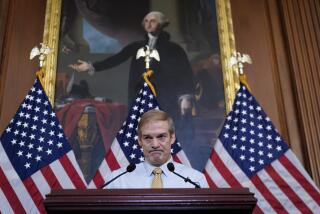No confidence
- Share via
IN DECEMBER 2000, before the outcome of the presidential recount was known, “Saturday Night Live” aired a sketch titled “A Glimpse of Our Possible Future.” In it, the imaginary President Bush hid under his desk to avoid delivering a State of the Union address, pleading, “I don’t want to go out, it’s too hard!” He then goes on to tell the country, “So, how we all doing out there, huh? Yeah, not so good. I broke the Hoover Dam ... we had that war thing happen.”
The comedy was that, even to those who doubted Bush’s confidence, it didn’t really seem possible back then that a country coasting along through peace and prosperity could really fall apart. In retrospect, though, the sketch seems eerily prescient, right down to the war and the imaginary Bush’s protestations, “I told you, this is hard!”
So here we are, with the administration having badly bungled a war and a major national disaster, not to mention making a complete hash of the budget. Yet Bush and his aides don’t seem very upset. And why should they be? There’s nothing anybody can do to them now.
A recent Op-Ed article in the Wall Street Journal by Fred Barnes -- the conservative pundit who most consistently reflects the administration’s outlook -- argued that Bush’s unpopularity should not hamper his ability to cram through his agenda. As Barnes writes, “The simple fact of governing in Washington is that popularity is not a measure of power.” He proceeds to quote a Bush aide practically gloating about the president’s low poll numbers.
The reason they have nothing to fear is that the structure of our political system makes our leaders almost completely unaccountable. If we had a parliamentary system, the opposition party would be calling for a vote of no confidence and a new election. Americans, though, can only hold an election every four years. And because the 22nd Amendment limits presidents to two terms, we’ll never get another chance to vote Bush out of office.
ONE REMEDY ought to be the prospect that voters could throw congressional Republicans out of power. Yet that is extraordinarily difficult to do. Republican states, which tend to be more sparsely populated, are disproportionately represented in the Senate. Bush won less than 52% of the vote in 2004, yet 62% of senators represent states that backed him.
The House is even tougher to flip. Not only did 59% of the districts vote for Bush in 2004, the seats are so gerrymandered that less than a tenth are even vaguely competitive. Political scientist Michael P. McDonald estimated that the Democrats would need about 57% of the total House vote to win control of the chamber.
In this context, Bush’s strategy of catering to his base and mostly ignoring the center makes perfect sense. All he needs to do is maintain the support of his own party. And he has. Democrats overwhelmingly disapprove of Bush’s performance, as do independents. But Republicans still love him.
Bill Kristol, another prominent conservative, recently told the New York Times, “I think the Clinton administration would have done a better job in handling Hurricane Katrina, but I’m also glad Bush is president and not a Democrat.”
What could this statement mean? Bush may have mishandled a massive natural disaster that may have killed thousands, displaced tens of thousands and cost tens of billions of dollars, but Kristol is still glad he’s president. Because we need his skillful handling of Iraq. No, I mean the federal budget. No, wait....
What I think it means is that Kristol, like most conservatives, will remain loyal to Bush as long as he remains ideologically true, no matter how badly he governs.
More to Read
Get the L.A. Times Politics newsletter
Deeply reported insights into legislation, politics and policy from Sacramento, Washington and beyond. In your inbox twice per week.
You may occasionally receive promotional content from the Los Angeles Times.










